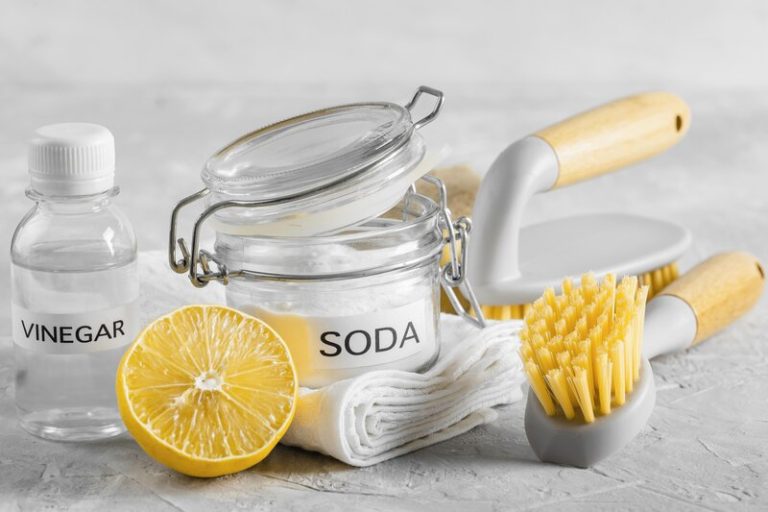A pleasant-smelling fridge can make all the difference in your kitchen. Wondering how to make fridge smell nice? It’s easier than you think!
From cleaning out your fridge regularly to using natural deodorisers like baking soda and lemon peels, we’ve got all the solutions you need.
Plus, we’ll share some preventive measures to keep your fridge smelling fresh for longer. Let’s dive in how to make fridge smell nice and make your fridge fresh again!
How To Make Fridge Smell Nice?
To keep your fridge smelling pleasant, follow these simple steps on how to make fridge smell nice. These easy methods will ensure a fresh and inviting fridge.
a. Clean Out Your Fridge Regularly
One of the most effective ways to keep your fridge smelling nice is to clean it out regularly, ensuring that no spoiled food or spills are left to generate bad odours.
Start the deep cleaning process by removing all items from your fridge. This not only allows you to declutter and organise your food items but also gives you a clean slate to work with.
Next, take out the shelves, drawers, and any removable parts to wipe them down thoroughly. Use a mixture of warm water and a mild detergent to ensure proper cleaning without damaging any components.
After wiping down the interior, scrub the walls and corners of your fridge with the same mild detergent solution. This step helps remove any stubborn stains or lingering odours.
By deep cleaning your fridge regularly, you not only maintain a hygienic environment for your food but also extend the lifespan of your appliance. A fresh-smelling fridge can enhance the overall kitchen experience and ensure your food stays fresh for longer.
b. Use Baking Soda to Absorb Odours
Placing an open box of bicarbonate of soda in your fridge is a simple yet effective method to absorb odours and keep your refrigerator smelling fresh.
Bicarbonate of soda, also known as baking soda, acts as a deodoriser by neutralising and eliminating foul smells rather than just masking them. When placed in the fridge, bicarbonate of soda helps to absorb and trap odours, preventing them from lingering and affecting the taste of your food.
For optimal results, position the open box of bicarbonate of soda on one of the shelves in the fridge, ideally away from any strong-smelling foods.
It is recommended to replace the bicarbonate of soda every three months to ensure its effectiveness in absorbing odours continuously.
c. Try Activated Charcoal
Activated charcoal is another powerful tool for absorbing fridge odours, and it’s particularly effective at neutralising strong smells.
When using activated charcoal in the fridge, it’s important to place it in an open container to allow for proper air circulation. You can simply place a few pieces of activated charcoal in a dish or a breathable bag and leave it in the back of the fridge.
Activated charcoal works by trapping odours rather than masking them. Its porous surface area is great at absorbing unwanted smells, making it a popular natural deodoriser choice.
It is recommended to replace the activated charcoal in the fridge every 1-2 months for optimal odour-absorbing efficiency.
d. Use Lemon or Orange Peels
Using lemon or orange peels is a natural way to add a pleasant fragrance to your fridge and help mask any unpleasant odours.
Simply place the peels in a small container or dish and leave them in the fridge. The citrus oils released by the peels work wonders in neutralising any lingering smells.
For optimal freshness, replace the peels every week. This simple trick can keep your fridge smelling clean and inviting without the need for artificial air fresheners.
e. Use White Vinegar
White vinegar is excellent for neutralising odours and can be used as a cleaning agent to help keep your fridge smelling fresh.
When using white vinegar to clean your fridge, create a simple solution by mixing equal parts of vinegar and water. This diluted mixture is gentle enough to be used on various surfaces inside your fridge without leaving behind a strong vinegar smell.
Start by removing all the items from your fridge and then wipe down the shelves, walls, and bins with the vinegar solution. The acidity of the vinegar helps to break down grease and grime while leaving a clean, fresh scent behind.
The odour-neutralising properties of white vinegar make it a great choice for eliminating any lingering food smells that might develop over time in your fridge, ensuring a pleasant and hygienic environment for your stored goods.
f. Try a Natural Deodoriser Spray
Using a natural deodoriser spray can be a quick and convenient way to eliminate fridge odours and keep your refrigerator smelling pleasant.
In terms of natural deodoriser sprays, there are various types available to choose from depending on personal preferences. Some popular options include citrus-based sprays, essential oil sprays, and enzyme-based sprays. Citrus-based sprays are known for their refreshing scent, while essential oil sprays offer a wide range of fragrances such as lavender, eucalyptus, or tea tree oil. Enzyme-based sprays are effective in breaking down organic matter causing odours.
To use a natural deodoriser spray, simply shake the bottle well and spray a generous amount inside your refrigerator. Be sure to target areas where odours tend to linger, such as near the vegetable drawers or shelves. Leave the refrigerator door open for a few minutes to allow the spray to work its magic.
In terms of effectiveness, natural deodoriser sprays are generally efficient in neutralising odours without harsh chemicals. Some well-known brands that offer natural deodoriser sprays include Mrs. Meyer’s Clean Day, Puracy, and Better Life. For those inclined towards DIY solutions, creating a homemade deodoriser spray is also an option. A simple recipe could involve mixing distilled water, baking soda, and a few drops of your favourite essential oil in a spray bottle.
How to Prevent Fridge Odours?
Besides knowing how to make your fridge smell nice, some things you can do to avoid fridge odours are:
a. Store Food Properly
Properly storing food in your fridge is essential to preventing odours, as it helps to contain smells and reduce the chances of food spoilage.
One effective method for storing various types of foods in the refrigerator is to use airtight containers. These containers help maintain the freshness of the food, prevent cross-contamination, and minimise the spread of odours.
Another useful practice is labelling leftovers with dates to keep track of their freshness and ensure they are consumed before spoilage occurs. Make sure all items are sealed properly to prevent odours from spreading to other food items in the fridge, maintaining the overall freshness of your stored food.
b. Keep Your Fridge at the Right Temperature
Maintaining the right temperature in your fridge is crucial for keeping food fresh and preventing odours from developing.
An ideal temperature range for a fridge is between 35°F to 38°F (1.6°C to 3.3°C). This range helps slow down the growth of bacteria that can cause food spoilage. To monitor the temperature, consider placing a fridge thermometer in a visible spot. Also, make sure not to overstuff your fridge as it can block airflow and lead to uneven cooling. By ensuring your fridge is set at the correct temperature, you can prolong the shelf life of your food, reduce waste, and maintain a fresh kitchen environment.
c. Use Air-Tight Containers
Using airtight containers for storing food in the fridge helps to prevent odours from spreading and keeps your fridge smelling fresh.
One of the key benefits of airtight containers is their ability to seal in moisture, which helps to keep food fresh for longer periods. These containers are also great for storing dry goods like rice, pasta, and cereals, as well as liquids like soups and sauces.
In terms of containing smells, airtight containers are a game-changer. They prevent strong odours from permeating other foods in the fridge, ensuring that each item maintains its original flavour.
There are various types of airtight containers available, including plastic, glass, and stainless steel options. Plastic containers are lightweight and affordable, while glass containers are durable and safe for use in the microwave and dishwasher.
To choose the right airtight container, look for ones with secure locking mechanisms and sturdy construction. Make sure to properly clean and dry the containers before storing food to maintain their efficacy.
d. Check for Spoiled Food Regularly
Regularly checking for spoiled food in your fridge is a simple yet effective way to prevent unpleasant odours.
Setting a routine for inspecting your fridge at least once a week can help in maintaining a fresh-smelling environment. By discarding expired products or items showing signs of spoilage, not only are you reducing the risk of foodborne illnesses but also enhancing the overall organization of your fridge.
When checking, pay attention to freshness dates, mould growth, and any unusual smells. Items like dairy products, meats, and leftovers are common culprits for going off quickly if not monitored regularly.
e. Use a Fridge Deodoriser
Using a fridge deodoriser can help maintain a pleasant smell in your fridge by neutralising odours before they become noticeable.
There are various types of fridge deodorisers available on the market, ranging from activated charcoal options to baking soda-based ones. Activated charcoal deodorisers are great at absorbing and trapping odours, keeping your fridge fresh. On the other hand, baking soda deodorisers work by actively neutralising odours. Placing a deodoriser near the back of the fridge or on the door shelves is ideal as these areas tend to accumulate the most odours. Popular brands like Arm & Hammer offer effective baking soda deodorisers, while some people opt for homemade solutions like placing a bowl of white vinegar to tackle tough smells.
How Often Should You Clean Your Fridge?
Cleaning your fridge regularly is key to preventing odours, with experts recommending a thorough cleaning every 3 to 4 months to ensure it stays fresh.
Regular cleaning not only prevents odours but also helps in maintaining a hygienic environment for your stored goods.
Some Other Tips to Keep Your Fridge Smelling Nice
Besides regular cleaning and using natural deodorisers, there are several other tips to keep your fridge smelling nice, such as using vanilla extract or lavender to add a pleasant fragrance.
One effective way to utilise vanilla extract is to place a few drops on a cotton ball or small cloth and leave it in the fridge. The sweet aroma of vanilla will help mask any unpleasant odours. Similarly, dried lavender can be placed in a small sachet or bowl in the fridge to provide a calming and refreshing scent.
Another tip is to sprinkle bicarbonate of soda inside the fridge to absorb any lingering odours. You can also add a few drops of essential oils, such as lemon or peppermint, to a cloth and wipe down the interior of the fridge for a fresh and clean smell.
By adopting these straightforward strategies, you can master how to make fridge smell nice and maintain a fresh, pleasant kitchen atmosphere. These simple practices ensure your fridge stays inviting and your food retains its quality, making your kitchen a more enjoyable space.
For those times when home remedies aren’t enough or if you’re facing stubborn odours that just won’t go away, it’s crucial to get professional help. TEKA Cleaning’s expert residential cleaning services can give your fridge—and your entire kitchen—a deep, thorough clean that goes beyond the basics. Our team uses advanced techniques and high-quality products to ensure every corner of your fridge is spotless and odour-free.
Don’t let lingering smells spoil your kitchen experience. Take the stress out of deep cleaning and let our professionals handle it for you. Contact TEKA Cleaning at 01233 751 544 today to schedule your cleaning service and ensure your fridge—and home—are impeccably fresh and clean. Act now to enjoy a healthier, more pleasant kitchen environment with minimal effort on your part.
Read also:











